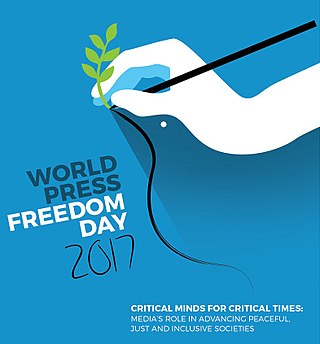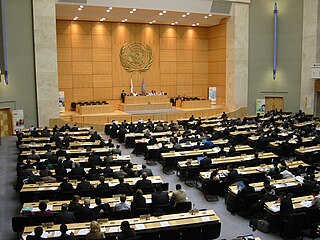
The United Nations Economic and Social Council (ECOSOC) is one of six principal organs of the United Nations, responsible for coordinating the economic and social fields of the organization, specifically in regards to the fifteen specialized agencies, the eight functional commissions, and the five regional commissions under its jurisdiction.

The member states of the United Nations comprise 193 sovereign states. The United Nations (UN) is the world's largest intergovernmental organization. All members have equal representation in the UN General Assembly.

The University for Peace (UPEACE) is an international university and intergovernmental organization established as a treaty organisation by the United Nations General Assembly in 1980. The university offers postgraduate, doctoral, and executive programmes related to the study of peace and conflict, environment and development, and international law.

Crimes against humanity are certain serious crimes committed as part of a large-scale attack against civilians. Unlike war crimes, crimes against humanity can be committed during both peace and war and against a state's own nationals as well as foreign nationals. Together with war crimes, genocide, and the crime of aggression, crimes against humanity are one of the core crimes of international criminal law and, like other crimes against international law, have no temporal or jurisdictional limitations on prosecution.

The United Nations General Assembly declared May 3 to be World Press Freedom Day or just World Press Day, observed to raise awareness of the importance of freedom of the press and remind governments of their duty to respect and uphold the right to freedom of expression enshrined under Article 19 of the 1948 Universal Declaration of Human Rights and marking the anniversary of the Windhoek Declaration, a statement of free press principles put together by African newspaper journalists in Windhoek in 1991.

The World Summit on the Information Society (WSIS) was a two-phase United Nations-sponsored summit on information, communication and, in broad terms, the information society that took place in 2003 in Geneva and in 2005 in Tunis. WSIS Forums have taken place periodically since then. One of the Summit's chief aims is to bridge the global digital divide separating rich countries from poor countries by increasing internet accessibility in the developing world. The conferences established 17 May as World Information Society Day.
Issues relating to the State of Israel and aspects of the Arab–Israeli conflict, and more recently the Iran–Israel conflict, occupy repeated annual debate times, resolutions and resources at the United Nations. Since its founding in 1948, the United Nations Security Council, has adopted 79 resolutions directly related to the Arab–Israeli conflict as of January 2010.

Citizen journalism, also known as collaborative media, participatory journalism, democratic journalism, guerrilla journalism, grassroots journalism, or street journalism, is based upon members of the community playing an active role in the process of collecting, reporting, analyzing, and disseminating news and information. Courtney C. Radsch defines citizen journalism "as an alternative and activist form of news gathering and reporting that functions outside mainstream media institutions, often as a response to shortcomings in the professional journalistic field, that uses similar journalistic practices but is driven by different objectives and ideals and relies on alternative sources of legitimacy than traditional or mainstream journalism". Jay Rosen offers a simpler definition: "When the people formerly known as the audience employ the press tools they have in their possession to inform one another." The underlying principle of citizen journalism is that ordinary people, not professional journalists, can be the main creators and distributors of news. Citizen journalism should not be confused with community journalism or civic journalism, both of which are practiced by professional journalists; collaborative journalism, which is the practice of professional and non-professional journalists working together; and social journalism, which denotes a digital publication with a hybrid of professional and non-professional journalism. Seungahn Nah and Deborah S. Chung say in their book "Understanding Citizen Journalism as Civic Participation" that citizen journalism is "highly embedded in local communities where community residents engage in day-to-day routines of community storytelling about local politics, public affairs, community events, neighborhood issues, schools, public transportation, land uses and environments, and much more."

The United Nations Human Rights Council (UNHRC) is a United Nations body whose mission is to promote and protect human rights around the world. The Council has 47 members elected for staggered three-year terms on a regional group basis. The headquarters of the Council are at the United Nations Office at Geneva in Switzerland.
The New World Information and Communication Order is a term coined in a debate over media representations of the developing world in UNESCO in the late 1970s early 1980s. The NWICO movement was part of a broader effort to formally tackle global economic inequality that was viewed as a legacy of imperialism upon the global south.
The World Summit Awards (WSA) rewards Information and Communications Technologies projects that have a positive impact on society at the local level. The award was initiated in 2003, within the framework of the United Nations World Summit on the Information Society. After the UN General Assembly adopted Resolution 56/183. The awards are open to companies, organizations, or individuals from any of the UN and the UNESCO Member States. They are divided into 8 different categories. The world summit awards are managed by the International Center for New Media (ICNM), a non-profit organization based in Salzburg, Austria. ICNM was founded by Peter A. Bruck, in 2002.
In its Proclamation on Aging, the United Nations General Assembly decided to declare 1999 as the International Year of Older Persons (IYOP). The proclamation was launched on 1 October 1998, the International Day of Older Persons, by United Nations Secretary General Kofi Annan.

Katalin Annamária Bogyay is a Hungarian ambassador, diplomat, journalist and the President of the United Nations Association of Hungary since April 2021. She has been a lecturer at the Corvinus University of Budapest since 2022, and teaching at the Hungarian Diplomatic Academy since 2021. In 2021 she founded the Women4Diplomacy movement. She served as the 15th Permanent Representative of Hungary to the United Nations in New York. She is the former Ambassador Extraordinary and Plenipotentiary and Permanent Delegate of Hungary to UNESCO (2009–2014) and the President of the 36th session of UNESCO General Conference (2011–2013).
Issues relating to the State of Palestine and aspects of the Israeli–Palestinian conflict occupy continuous debates, resolutions, and resources at the United Nations. Since its founding in 1948, the United Nations Security Council, as of January 2010, has adopted 79 resolutions directly related to the Arab–Israeli conflict.
Palestine 194 is an ongoing diplomatic campaign by the Palestinian National Authority to gain membership in the United Nations for the State of Palestine. The name of the campaign is a reference to Palestine becoming the 194th member of the UN. The UN campaign is part of a strategy to gain international recognition of the State of Palestine, based on the borders prior to the Six-Day War, with East Jerusalem as its capital. The initiative developed during a two-year impasse in negotiations with Israel that followed the latter's refusal to freeze its settlement activities in the West Bank. The campaign was reported in the media as early as late 2009, and gained prominence during the leadup to the 66th Session of the General Assembly in September 2011. Palestinian President Mahmoud Abbas submitted the application to the Secretary-General Ban Ki-moon on 23 September 2011, which the Security Council has yet to vote on.

Amina Jane Mohammed is a Nigerian-British diplomat and politician who is serving as the 5th Deputy Secretary-General of the United Nations. Previously, she was Nigerian Minister of Environment from 2015 to 2016 and was a player in the Post-2015 Development Agenda process. She is also Chair of United Nations Sustainable Development Group.

The Report of the Commission of Inquiry on Human Rights in the Democratic People's Republic of Korea is the landmark document resulting from the investigations on human rights in North Korea commissioned by the United Nations Human Rights Council in 2013 and concluded in 2014.
The People's Socialist Republic of Albania joined the United Nations on 14 December 1955, and has participated in several UN peacekeeping operations. The current Representative of Albania in the UN is Mr. Ferit Hoxha. Albania is a non-permanent member of the 15-country UN Security Council for the two-year term (2022–2023).

Safety of journalists is the ability of journalists and media professionals to receive, produce and share information without facing physical or moral threats.

Sinikka Sipilä is a Finnish librarian, president of the International Federation of Library Associations and Institutions - IFLA from 2013 to 2015 overseeing the Lyon Declaration global petition connecting library associations and librarians with the priorities of the UN Sustainable Development Goals. Sipilä was IFLA president elect 2011–2013 and a member of the governing board from 2007–2011 and held the position of secretary general of the Finnish Library Association 1997–2015.













